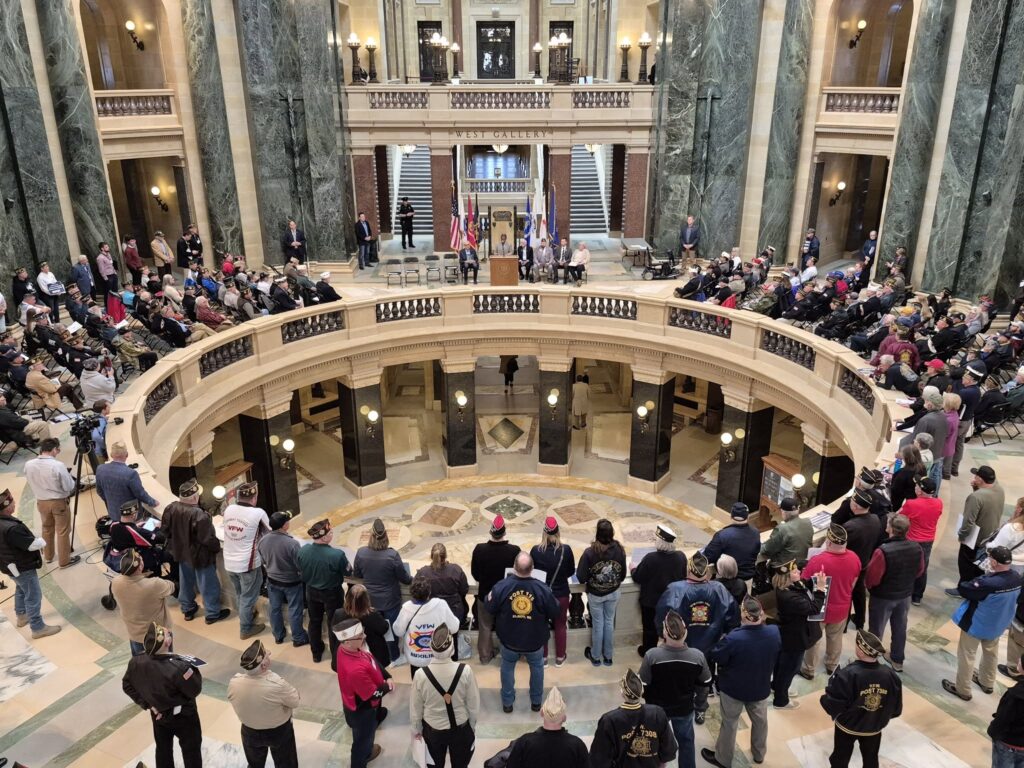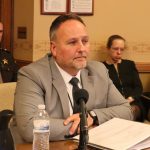Despite Action, Bill Might Be Too Late To Stop Veterans Housing Closure
Two facilities weren't funded in state budget, Sept. 30 deadline looms.

Gov. Tony Evers and Veterans Affairs Sec. James Bond spoke an event for veterans in the state Capitol on April 22, 2025. (Photo via Wisconsin Department of Veterans Affairs Facebook page)
A Republican bill that would provide funding for the Veterans Housing and Recovery Program received a hearing in the state Senate on Thursday, advancing a potential solution to the cuts the program is facing even as it appears too late to stop the closures.
Sen. André Jacque (R-New Franken), the lead author on the proposal, told the Senate Natural Resources, Veteran and Military Affairs committee that it is the responsibility of lawmakers to ensure that Wisconsin “properly honors the sacrifices made by our brave men and women of the armed services” and his bill would help do that. He also serves as the chair of the committee.
“I know that there’s been a lot of confusion and contentious finger pointing over responsibility for the interruption of service at these sites. Ideally, these issues would have already been resolved but finger pointing accomplishes nothing,” Jacque said.
The Veterans Housing and Recovery Program (VHRP) has been a source of back-and-forth between Gov. Tony Evers and Democratic lawmakers and Republican lawmakers since the closure of two sites, one in Chippewa Falls and the other in the Green Bay area, was announced in July.
The program, operated by the Wisconsin Department of Veterans Affairs, has focused on providing support to veterans on the verge of or experiencing homelessness, including those who have experienced incarceration, unemployment or physical and mental health problems. Veterans in the program are able to participate for a maximum of 24 months, but the average length of stay is six to 10 months.
Evers announced in July that the sites would close on Sept. 30 due to a lack of state funding in the budget. He had requested an additional $2 million from lawmakers to help sustain the program, but that request wasn’t heeded and Democratic attempts to put the funding back in the budget were rejected by Republicans — apart from Jacque, who voted with Democrats.
Gov. Tony Evers’ administration announced shortly after the end of the budget process in July that the two facilities would be closing.
Evers blamed the closures on lawmakers for not providing the additional funds, while lawmakers said Evers didn’t try to negotiate for the funding.
Then some Republican lawmakers who represent areas surrounding the facilities started claiming that money should be available for the administration to use. In a 16-page letter on Sept. 10, a handful of Republican lawmakers, including Sens. Eric Wimberger (R-Oconto) and Jesse James (R-Thorp) and Reps. Karen Hurd (R-Withee) and Benjamin Franklin (R-De Pere), claimed that the Evers administration should have access to funds to help support the program. That letter pointed to the balance that the WDVA returns at the end of the year, though an agency spokesperson has noted that the agency cannot spend funds on whatever the administration chooses, and is “only allowed to spend the money they tell us to spend.”
Evers had also denied the claim, saying “the money is not there.” He noted that a paper from the nonpartisan Legislative Fiscal Bureau to the Joint Finance Committee warned lawmakers that additional funds were needed for the program.
“Without additional funding, the Department [of Veterans Affairs] would not have sufficient resources to maintain the program’s three sites,” the paper stated.
Senate Bill 411 would provide $900,000 in 2025-26 and $1,050,000 in 2026-27 for the program and for costs associated with the Chippewa Falls site. Jacque’s bill also includes two other policy changes that he said veterans have been requesting. One would require the Board of Regents of the University of Wisconsin system to provide funding to the UW Missing-in-Action Recovery and Identification Project to support missions to recover and identify Wisconsin veterans who are missing, and the other would lower the eligibility threshold for veterans and surviving spouses to claim the veterans and surviving spouses property tax credit.
“We have the opportunity to achieve a proactive, bipartisan solution to the funding problem, and I encourage my committee members to join me in approving this funding package,” Jacque said. “Supporting our veterans has not been and must not be a partisan fight. I truly believe there’s enough support and good will on both sides of the aisle to accomplish each of these priorities.”
The bill currently has only nine Republican sponsors and no Democratic sponsors. Democratic lawmakers had proposed their own bill with Senate Minority Leader Dianne Hesselbein (D-Middleton) saying at a press conference that she preferred “clean legislation.” That bill is unlikely to advance in the Republican-led Legislature even as Democrats call for a bill hearing on it.
Jacque said legislators are also discussing the potential for the Joint Finance Committee to reallocate funds for the program, and that his conversations about his bill have been productive on both sides of the aisle.
“That was my goal in bringing it forward immediately after the budget was done, to have a vehicle to continue that conversation and make sure that we get some additional progress done on these issues beyond budget,” Jacque said.
The VHRP has been funded through three revenue streams: trust fund payments, payments made by program participants and per diem payments, which are made to the agency by the federal government at a current rate of about $71 per resident per day.
Growing staffing and maintenance costs have strained those funds. A contract with Lutheran Social Services, which staffs the facilities, makes up about 70% of the costs. The Evers administration had postponed some of the looming financial hardship by allocating American Rescue Plan Act funding to the program in 2023-24, but those funds have been expended.
WDVA Assistant Deputy Secretary Joey Hoey said in testimony that it is too late to stop the closure of the facilities at least for a time.
Hoey said that when the budget passed on July 3, the three VHRP sites were in their fourth year of the federal VA’s Grant and Per Diem (GPD) Program with the option to renew for a fifth and final year starting October 1, 2025.
The agency was forced to consolidate the facilities to the Union Grove location, the site in best physical condition, without dedicated state funding for the program. The agency also had to notify the USDVA that it would not be renewing its grant agreement for Chippewa Falls. It asked to renew and change the scope of the grant agreement that covers both Union Grove and Green Bay, reducing the total number of beds from 57 to 40 to reflect the closure of the Green Bay facility.
“Being forced to close our facilities in Green Bay and Chippewa Falls was gut wrenching for the veterans and for staff,” Hoey said. “I want to assure everyone in this room that with the help of veteran advocates, our partners at Lutheran Social Services and others, we were able to provide all the veterans in our care at Green Bay and Chippewa Falls with alternative options. As of last week, neither facility has any veterans still at the facility. All those residents have been successfully placed either in other treatment programs for veterans, other treatment programs that are not veteran centered, some have moved to Minneapolis, some moved to Michigan, a good amount have moved to our facility in Union Grove, but no veterans were kicked out on the street.”
Hoey said even if the state were to pass the bill before the end of September, the state agency cannot rescind the notification for Chippewa Falls. It would only be able to apply for the next round of grants, which wouldn’t be available until October 2026.
“The earliest we could resume the program in Chippewa Falls would be sometime after October 1, 2026,” Hoey said. “If this bill passes, we stand ready to ask the USDVA to change the scope of our agreement covering Union Grove and Green Bay to go back up to the 57 beds included in the original grant. We believe that the USDVA would approve that change, meaning we could resume the program in Green Bay relatively quickly, provided that the landlord has not rented out the facility we were using and that we can sign a contract with Lutheran Social Services.”
GOP bill to fund veterans housing program gets hearing, but not in time to stop closures was originally published by Wisconsin Examiner
If you think stories like this are important, become a member of Urban Milwaukee and help support real, independent journalism. Plus you get some cool added benefits.





















Republican lawmakers blame Evers for not negotiating for the funding to support veterans on the verge of homelessness?
Huh? So for Republicans the lives and livelihood of veterans is a bargaining chip?
Remember in November.